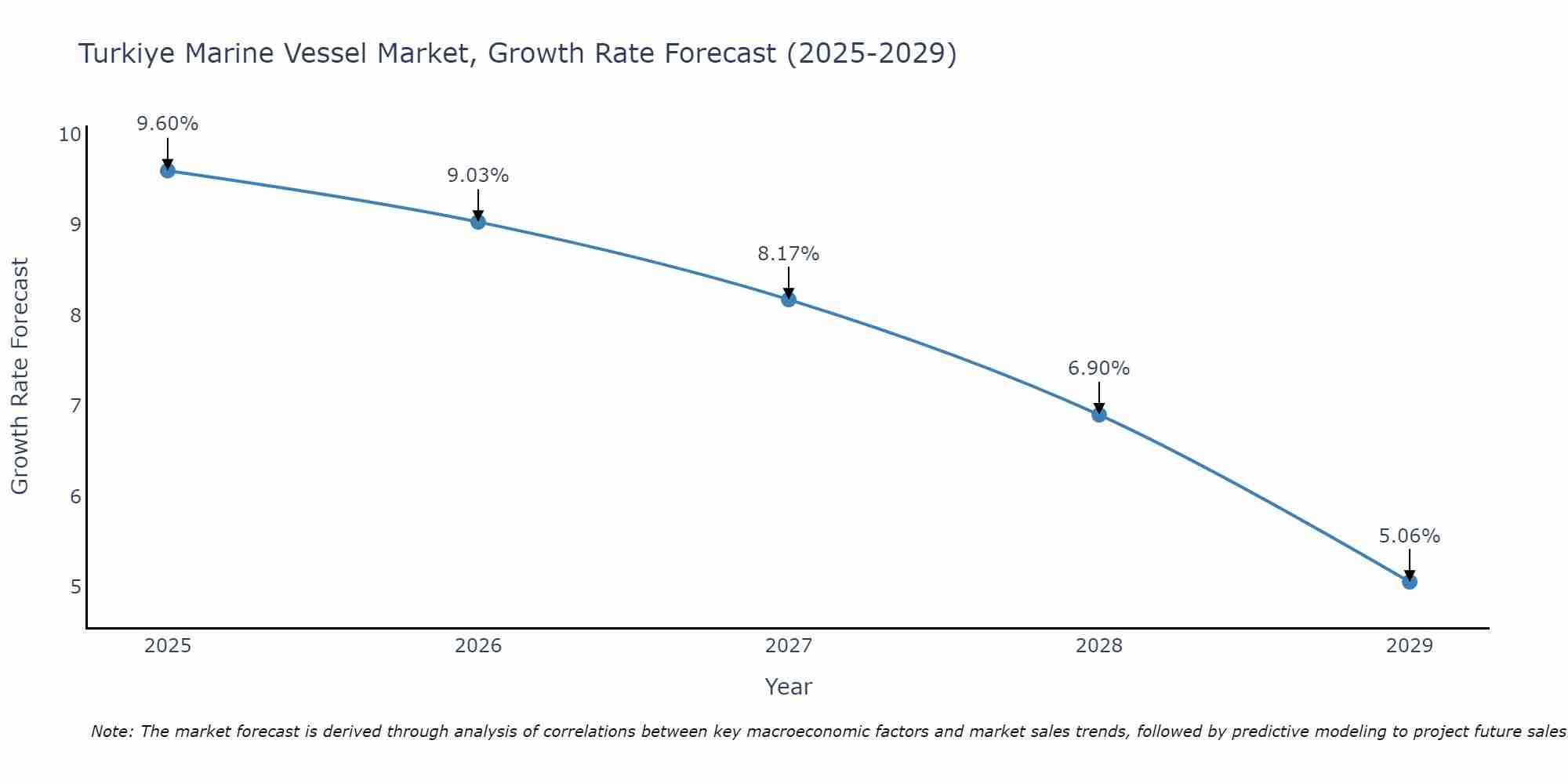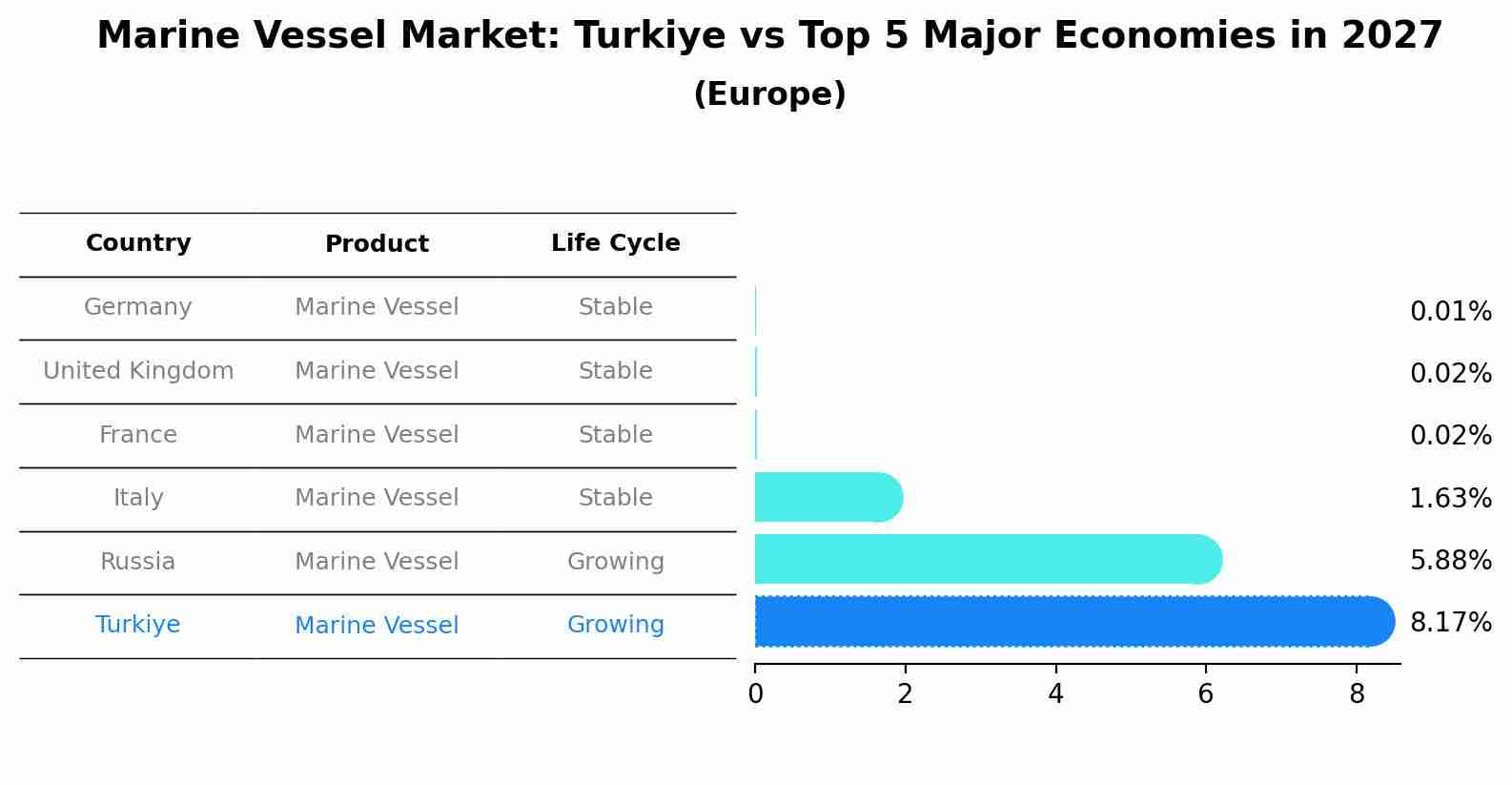Turkey Marine Vessel Market Outlook | Value, Size, COVID-19 IMPACT, Industry, Analysis, Revenue, Forecast, Trends, Share, Companies & Growth
| Product Code: ETC383018 | Publication Date: Aug 2022 | Updated Date: Jul 2025 | Product Type: Market Research Report | |
| Publisher: 6Wresearch | Author: Summon Dutta | No. of Pages: 75 | No. of Figures: 35 | No. of Tables: 20 |
Turkiye Marine Vessel Market Size Growth Rate
The Turkiye Marine Vessel Market may undergo a gradual slowdown in growth rates between 2025 and 2029. Starting high at 9.60% in 2025, the market steadily declines to 5.06% by 2029.

Marine Vessel Market: Turkiye vs Top 5 Major Economies in 2027 (Europe)
In the Europe region, the Marine Vessel market in Turkiye is projected to expand at a growing growth rate of 8.17% by 2027. The largest economy is Germany, followed by United Kingdom, France, Italy and Russia.

Turkey Marine Vessel Market Synopsis
The Turkey Marine Vessel Market is a dynamic sector characterized by a diverse range of vessels including cargo ships, tankers, passenger ships, and yachts. The market is influenced by factors such as the country`s strategic location between Europe and Asia, its extensive coastline, and its significant role in international trade, particularly in the shipping industry. Turkey`s shipbuilding industry has been growing steadily, supported by government incentives and investments in infrastructure. The market also benefits from a skilled workforce and advanced technology in shipbuilding, contributing to the production of high-quality vessels. However, challenges such as regulatory compliance, environmental concerns, and global economic conditions impact the market`s growth potential, requiring stakeholders to adapt to changing market dynamics.
Turkey Marine Vessel Market Trends
The Turkey Marine Vessel Market is experiencing several key trends currently. One major trend is the increased demand for eco-friendly and energy-efficient vessels, driven by a growing emphasis on sustainability within the industry. Another notable trend is the rising popularity of smaller and more versatile vessels, catering to the preferences of recreational boaters and small-scale commercial operators. Additionally, there is a noticeable shift towards advanced technology integration in marine vessels, including digital navigation systems, automation, and remote monitoring capabilities. This trend is aimed at improving efficiency, safety, and overall performance of the vessels. Overall, these trends indicate a market that is evolving towards more sustainable, efficient, and technologically advanced marine vessels in Turkey.
Turkey Marine Vessel Market Challenges
In the Turkey Marine Vessel Market, some key challenges include regulatory issues and compliance with international standards, fluctuating fuel prices impacting operational costs, competition from other maritime hubs in the region, and the need for continuous technological advancements to enhance vessel efficiency and safety. Additionally, economic uncertainties and geopolitical tensions in the region can also pose challenges for the market. Overall, addressing these challenges requires strategic planning, investment in sustainable practices, collaboration with industry stakeholders, and staying abreast of market trends to ensure competitiveness and growth in the Turkey Marine Vessel Market.
Turkey Marine Vessel Market Investment Opportunities
The Turkey Marine Vessel Market presents various investment opportunities for both domestic and international investors. With Turkey`s strategic location between Europe and Asia, there is a growing demand for marine vessels for transportation, shipping, tourism, and offshore activities. Investing in the construction and operation of container ships, oil tankers, passenger ferries, or even luxury yachts can be lucrative in this market. Additionally, there is potential for investments in port infrastructure development, marine technology, and sustainable shipping practices to meet the increasing environmental regulations. Partnering with local shipyards or forming joint ventures with Turkish companies can help navigate the market dynamics and leverage Turkey`s skilled workforce and competitive production costs. Overall, the Turkey Marine Vessel Market offers diverse opportunities for investors looking to capitalize on the country`s maritime industry growth.
Jordan Agar Market Government Policies
The Turkey Marine Vessel Market is subject to various government policies aimed at regulating and promoting the industry. The Turkish government has implemented measures such as tax incentives, subsidies, and investment support to stimulate growth in the sector. Additionally, there are regulations in place regarding safety standards, environmental protection, and licensing requirements for operating marine vessels in Turkish waters. The government also plays a role in promoting domestic shipbuilding capabilities through localization requirements and supporting research and development activities within the industry. Overall, government policies in Turkey aim to create a competitive and sustainable marine vessel market while ensuring compliance with international standards and regulations.
Turkey Marine Vessel Market Future Outlook
The future outlook for the Turkey Marine Vessel Market appears promising, driven by factors such as increasing investments in the shipbuilding industry, rising demand for maritime transport services, and the country`s strategic location as a bridge between Europe and Asia. The market is expected to experience growth in segments such as commercial vessels, including container ships and bulk carriers, as well as cruise ships and yachts. Additionally, advancements in technology, such as the adoption of eco-friendly designs and digitalization in vessel operations, are likely to further propel the market forward. However, challenges such as regulatory changes, global economic uncertainties, and competition from other shipbuilding nations may influence the market dynamics in the coming years. Overall, the Turkey Marine Vessel Market is poised for expansion with opportunities for innovation and sustainable growth.
Key Highlights of the Report:
- Turkey Marine Vessel Market Outlook
- Market Size of Turkey Marine Vessel Market, 2021
- Forecast of Turkey Marine Vessel Market, 2031
- Historical Data and Forecast of Turkey Marine Vessel Revenues & Volume for the Period 2018 - 2031
- Turkey Marine Vessel Market Trend Evolution
- Turkey Marine Vessel Market Drivers and Challenges
- Turkey Marine Vessel Price Trends
- Turkey Marine Vessel Porter's Five Forces
- Turkey Marine Vessel Industry Life Cycle
- Historical Data and Forecast of Turkey Marine Vessel Market Revenues & Volume By Type for the Period 2018 - 2031
- Historical Data and Forecast of Turkey Marine Vessel Market Revenues & Volume By Commercial Vessel for the Period 2018 - 2031
- Historical Data and Forecast of Turkey Marine Vessel Market Revenues & Volume By Passenger Ship for the Period 2018 - 2031
- Historical Data and Forecast of Turkey Marine Vessel Market Revenues & Volume By LNG/LPG Carrier for the Period 2018 - 2031
- Historical Data and Forecast of Turkey Marine Vessel Market Revenues & Volume By Special Purpose Vessel for the Period 2018 - 2031
- Historical Data and Forecast of Turkey Marine Vessel Market Revenues & Volume By System for the Period 2018 - 2031
- Historical Data and Forecast of Turkey Marine Vessel Market Revenues & Volume By Marine Engine for the Period 2018 - 2031
- Historical Data and Forecast of Turkey Marine Vessel Market Revenues & Volume By Sensor System for the Period 2018 - 2031
- Historical Data and Forecast of Turkey Marine Vessel Market Revenues & Volume By Control System for the Period 2018 - 2031
- Historical Data and Forecast of Turkey Marine Vessel Market Revenues & Volume By Electrical System for the Period 2018 - 2031
- Historical Data and Forecast of Turkey Marine Vessel Market Revenues & Volume By Auxiliary System for the Period 2018 - 2031
- Historical Data and Forecast of Turkey Marine Vessel Market Revenues & Volume By Communication System for the Period 2018 - 2031
- Historical Data and Forecast of Turkey Marine Vessel Market Revenues & Volume By End-use for the Period 2018 - 2031
- Historical Data and Forecast of Turkey Marine Vessel Market Revenues & Volume By Original Equipment Manufacturer (OEM) for the Period 2018 - 2031
- Historical Data and Forecast of Turkey Marine Vessel Market Revenues & Volume By Aftermarket for the Period 2018 - 2031
- Turkey Marine Vessel Import Export Trade Statistics
- Market Opportunity Assessment By Type
- Market Opportunity Assessment By System
- Market Opportunity Assessment By End-use
- Turkey Marine Vessel Top Companies Market Share
- Turkey Marine Vessel Competitive Benchmarking By Technical and Operational Parameters
- Turkey Marine Vessel Company Profiles
- Turkey Marine Vessel Key Strategic Recommendations
Frequently Asked Questions About the Market Study (FAQs):
Export potential assessment - trade Analytics for 2030
Export potential enables firms to identify high-growth global markets with greater confidence by combining advanced trade intelligence with a structured quantitative methodology. The framework analyzes emerging demand trends and country-level import patterns while integrating macroeconomic and trade datasets such as GDP and population forecasts, bilateral import–export flows, tariff structures, elasticity differentials between developed and developing economies, geographic distance, and import demand projections. Using weighted trade values from 2020–2024 as the base period to project country-to-country export potential for 2030, these inputs are operationalized through calculated drivers such as gravity model parameters, tariff impact factors, and projected GDP per-capita growth. Through an analysis of hidden potentials, demand hotspots, and market conditions that are most favorable to success, this method enables firms to focus on target countries, maximize returns, and global expansion with data, backed by accuracy.
By factoring in the projected importer demand gap that is currently unmet and could be potential opportunity, it identifies the potential for the Exporter (Country) among 190 countries, against the general trade analysis, which identifies the biggest importer or exporter.
To discover high-growth global markets and optimize your business strategy:
Click Here- Single User License$ 1,995
- Department License$ 2,400
- Site License$ 3,120
- Global License$ 3,795
Search
Thought Leadership and Analyst Meet
Our Clients
Related Reports
- Saudi Arabia Car Window Tinting Film, Paint Protection Film (PPF), and Ceramic Coating Market (2025-2031) | Strategy, Consumer Insights, Analysis, Investment Trends, Opportunities, Growth, Size, Share, Industry, Revenue, Segments, Value, Segmentation, Supply, Forecast, Restraints, Outlook, Competition, Drivers, Trends, Demand, Pricing Analysis, Competitive, Strategic Insights, Companies, Challenges
- South Africa Stationery Market (2025-2031) | Share, Size, Industry, Value, Growth, Revenue, Analysis, Trends, Segmentation & Outlook
- Afghanistan Rocking Chairs And Adirondack Chairs Market (2026-2032) | Size & Revenue, Competitive Landscape, Share, Segmentation, Industry, Value, Outlook, Analysis, Trends, Growth, Forecast, Companies
- Afghanistan Apparel Market (2026-2032) | Growth, Outlook, Industry, Segmentation, Forecast, Size, Companies, Trends, Value, Share, Analysis & Revenue
- Canada Oil and Gas Market (2026-2032) | Share, Segmentation, Value, Industry, Trends, Forecast, Analysis, Size & Revenue, Growth, Competitive Landscape, Outlook, Companies
- Germany Breakfast Food Market (2026-2032) | Industry, Share, Growth, Size, Companies, Value, Analysis, Revenue, Trends, Forecast & Outlook
- Australia Briquette Market (2025-2031) | Growth, Size, Revenue, Forecast, Analysis, Trends, Value, Share, Industry & Companies
- Vietnam System Integrator Market (2026-2032) | Size, Companies, Analysis, Industry, Value, Forecast, Growth, Trends, Revenue & Share
- ASEAN and Thailand Brain Health Supplements Market (2025-2031) | Strategy, Consumer Insights, Analysis, Investment Trends, Opportunities, Growth, Size, Share, Industry, Revenue, Segments, Value, Segmentation, Supply, Forecast, Restraints, Outlook, Competition, Drivers, Trends, Demand, Pricing Analysis, Competitive, Strategic Insights, Companies, Challenges
- ASEAN Bearings Market (2025-2031) | Strategy, Consumer Insights, Analysis, Investment Trends, Opportunities, Growth, Size, Share, Industry, Revenue, Segments, Value, Segmentation, Supply, Forecast, Restraints, Outlook, Competition, Drivers, Trends, Demand, Pricing Analysis, Competitive, Strategic Insights, Companies, Challenges
Industry Events and Analyst Meet
Whitepaper
- Middle East & Africa Commercial Security Market Click here to view more.
- Middle East & Africa Fire Safety Systems & Equipment Market Click here to view more.
- GCC Drone Market Click here to view more.
- Middle East Lighting Fixture Market Click here to view more.
- GCC Physical & Perimeter Security Market Click here to view more.
6WResearch In News
- Doha a strategic location for EV manufacturing hub: IPA Qatar
- Demand for luxury TVs surging in the GCC, says Samsung
- Empowering Growth: The Thriving Journey of Bangladesh’s Cable Industry
- Demand for luxury TVs surging in the GCC, says Samsung
- Video call with a traditional healer? Once unthinkable, it’s now common in South Africa
- Intelligent Buildings To Smooth GCC’s Path To Net Zero


















